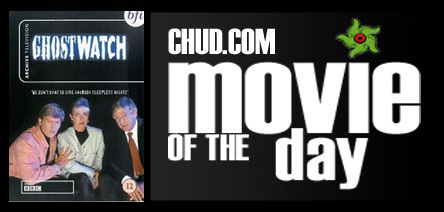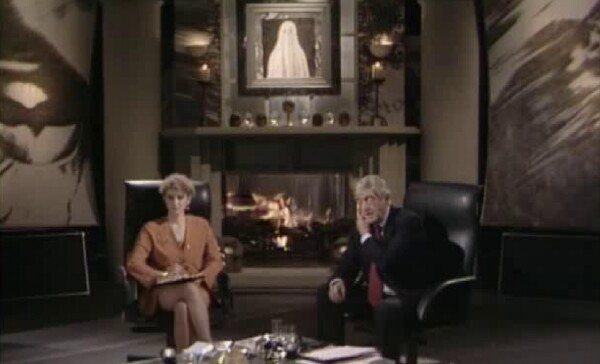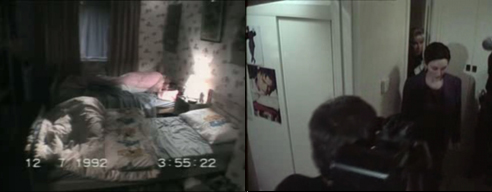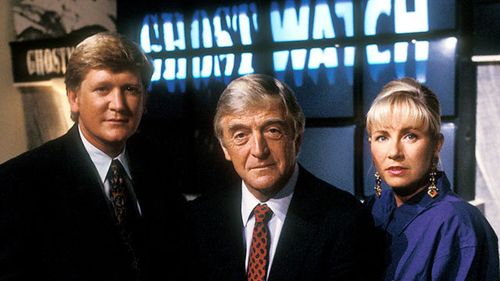
The Film: Ghostwatch (1992)
The Principals: Michael Parkinson, Sarah Greene, Mike Smith, Craig Charles, Gillian Bevan. Created by Stephen Volk.
The Premise: It is Halloween night and BBC1 is airing a live edition of Ghostwatch, a series that explores supernatural phenomena and also invites callers to phone in with stories of their own ghostly encounters. In the studio, veteran British television personality Michael Parkinson coordinates the program with paranormal expert Dr. Lin Pascoe (Bevan) by his side, while field reporters Sarah Greene and Craig Charles investigate a home in Northolt, Greater London, supposedly haunted by a malevolent spirit nicknamed “Pipes” by the locals, due to the ghost’s penchant for knocking on the home’s plumbing.

Is It Good: For those who love a slow burn (and dry British sensibilities) it is rather remarkable. While Ghostwatch, along with 1980’s Cannibal Holocaust, can now be viewed as a grandfather to the “found footage” genre, its own roots most directly lie with Orson Welles’ 1938 Halloween Eve broadcast-turned-inadvertent-super-prank radio play of The War of the Worlds. Only an idiot or the most socially detached individual could go into The Blair Witch Project and think it was real. You would have heard about this history-making “documentary” on the news long before it hit theaters if it actually contained footage of people being killed by ghosts. But like Welles’ famous broadcast, Ghostwatch pretends very convincingly to be a live television broadcast that goes disastrously wrong — in fact, it is almost too convincing. As I said, the TV special is a very, very slow burn, and brilliantly captures the slapdash aesthetics of a low-budget live broadcast. The program inches, ever so slowly, into creepier and creepier elements, until finally exploding in its last minutes with genuinely frightening and unnerving bits. But prior to that we’re treated to a hooky exploration of a family claiming to be plagued by an evil ghost. Craig Charles runs around the Northolt neighborhood grabbing plausibly dull interviews from people and making a general and further plausible ass of himself. Michael Parkinson and Dr. Lin Pascoe take callers live on the air, some of which I’m quite sure are actual callers telling real stories, considering BBC1 used their real station number on the program. It is all very savvy.
In fact, the savvier details of Ghostwatch are going to be largely lost on modern American audiences, who are obviously unfamiliar with local British programming from the early 1990s. To us Statesiders, the program’s hosts and reporters are just actors, but Michael Parkinson, Sarah Greene, Mike Smith, and Craig Charles are all actual TV personalities playing themselves. Mike Smith’s concern for the increasingly endangered Sarah Greene, as he remains trapped in the studio manning the phones, is rooted in reality, as the two were man and wife in real life. Michael Parkinson, a beloved talk show host, anchors the unfolding events perfectly. He may not be an actor, but years of interviews clearly gave him the right perspective on how and when to give a dubious smirk of disbelief to Dr. Lin Pascoe or to the ramblings of an unhelpful caller. Despite the fact that the program aired as part of the BBC anthology series, Screen One, and featured standard writing and acting credits, it is easy to see why so many Brits became convinced they were watching an actual live supernatural disaster on the ‘tellie.’ Further deepening the credibility was the fact that so many viewers called the station that the phones became tied up, so instead of receiving a pre-recorded message informing them that Ghostwatch was fake, they got a busy tone. Without giving away the climax of the film, I’ll just say that a dead phone line is exactly what you’d expect to hear based on how Ghostwatch closes out.
Creator Stephen Volk (Gothic, The Guardian) was drawing from the kinds of things one would typically see on a live “call-in” BBC show, but it is interesting how many now-familiar Paranormal Activity-esque bits he and director Lesley Manning ended up using. Due to budgetary and technical constraints, like PA and its current imitators, Ghostwatch doesn’t have special FX to fall back on. Suspense and chills come from timing and the use of silence and space. And unlike PA, in which we’re stuck with only two rather annoying characters, Ghostwatch is able to utilize its format to further the eeriness once things get going. The backstory on Pipes evolves over the course of the program, through interviews and one pointed phone call, and the narrative finally kicks into gear when we begin to suspect that Pipes may in fact be real and that he may be interfering with the broadcast itself. It is the best kind of cleverness, the kind you underestimate. I only wish I could have been a kid watching the program “live” on BBC1 back in ’92.
Hopefully some of our UK readers can chime in on this one with their own memories.

Is It Worth A Look: If you can find it, most definitely. Even if you aren’t that entertained by it, it is now an interesting curio of horror TV, not to mentioned a prototype for one of the more prevalent filmmaking gimmicks of the past ten years.
Random Anecdote: The film was banned from being re-aired on British television after the brouhaha caused by the original broadcast.
Cinematic Soulmates: Grave Encounters, The Last Broadcast, [REC].
